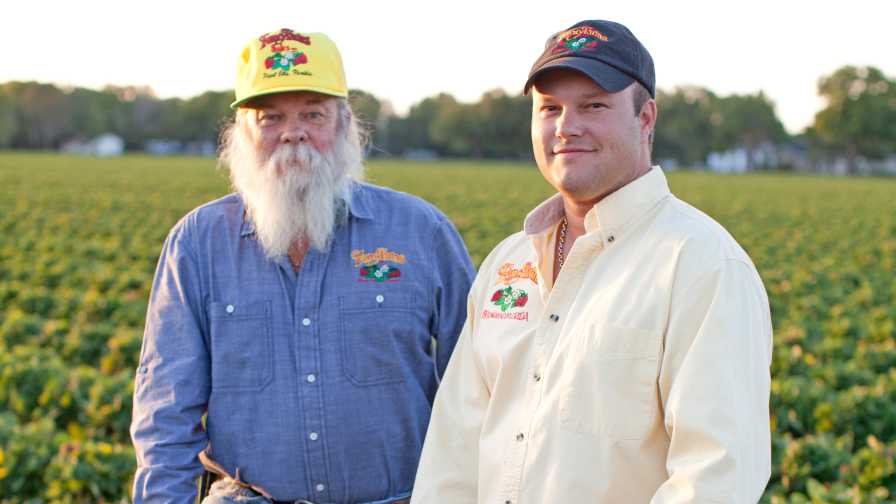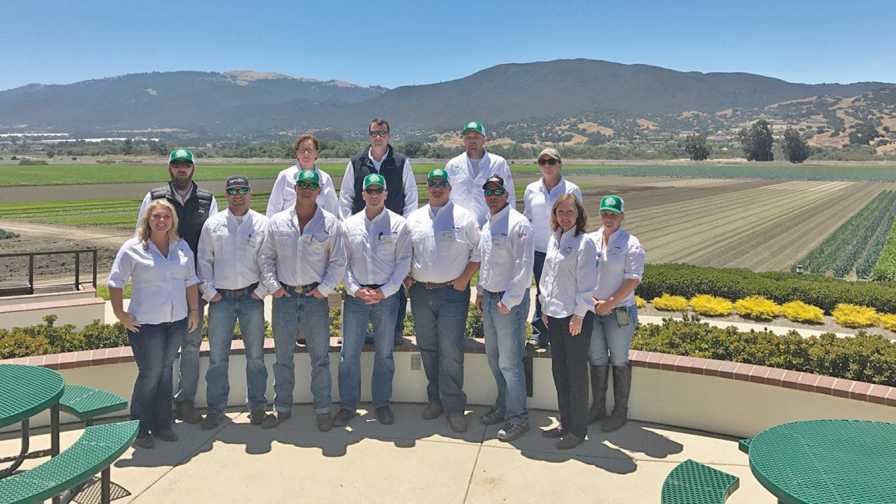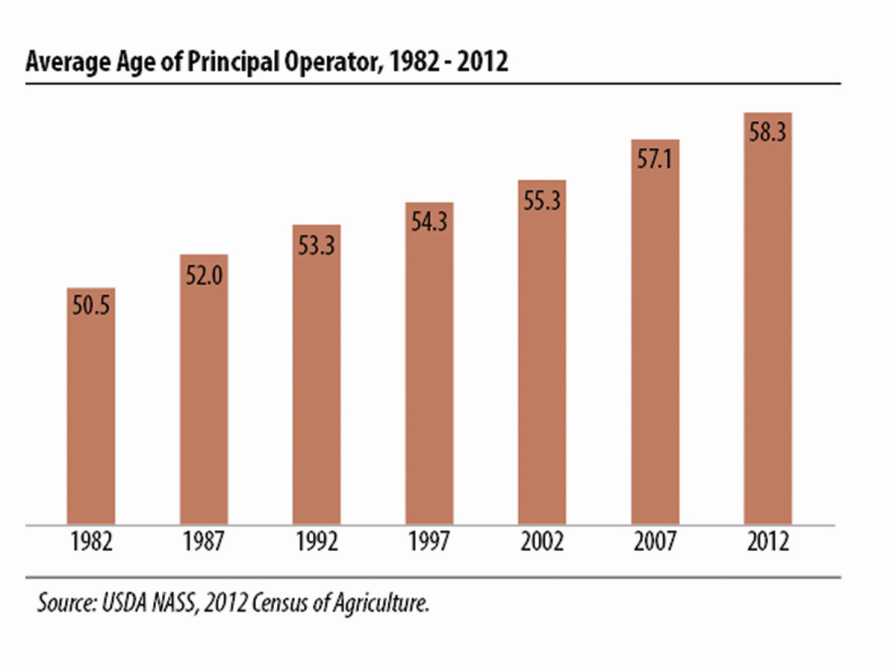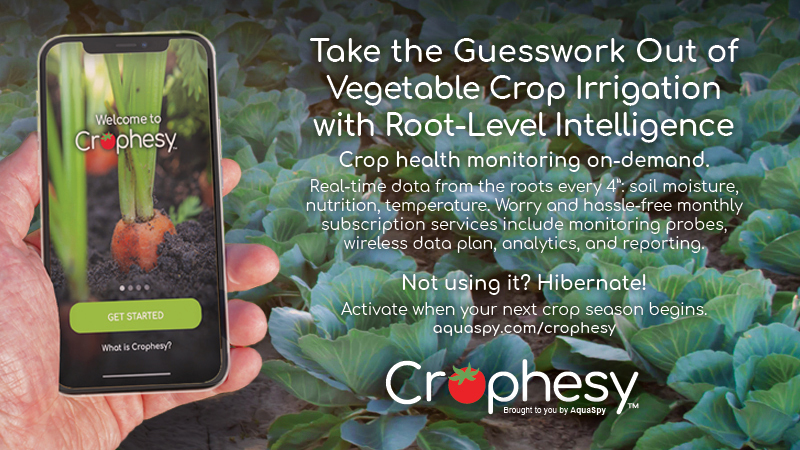Young Florida Farmers Ready to Take the Reins

Dustin Grooms and his father Carl of Fancy Farms have worked through transition of leadership involving the company’s day-to-day operations.
Photo courtesy of Fancy Farms
Coffee shop talk among growers often revolves around insects and diseases, markets, and the weather. They’re all worthy topics to address in order to hopefully bring home a good and profitable crop. But, another challenge is brewing in agriculture that has been years in the making — the aging of America’s farmers.
According to the 2012 Census of Agriculture, Florida mirrors the national trend with a current grower average age of 59.8 years. To gauge how heavily skewed the aging trend is, the census shows that Florida growers ages 25 to 34 only make 5.1% of the population and growers ages 35 to 44 only make 11.9% of the population. Likewise, growers ages 55 to 64 make up 31.9% of the state’s grower population and those ages 65 to 74 represent 24%.
Developing the Future
Everyone involved in agriculture understands the dire challenge presented by the aging grower population, and because of that, there is an abundance of programs dedicated to developing the next generation of grower leaders. Beyond the basics of growing the nation’s food, there is a need to develop young growers with the skills to represent the industry on the public and political scene.
The Florida Fruit & Vegetable Association has stepped up to this challenge with its Emerging Leader Development Program (ELDP). Six classes have gone through the program to the benefit of 65 young professionals. Not all are growers, but many are, and all participants are involved in the agriculture industry in some capacity. The seventh class is now being selected and will be introduced during the association’s annual conference in September.
Sonia Tighe coordinates the ELDP and says it is fulfilling and encouraging to see the caliber of young professionals who pass through the program. Part of the intention of the program is to develop leaders to take the reins of leadership within FFVA during the future.
“Several of our members have commented that the creation of the ELDP has been one of the best things FFVA has done,” she says. “We highly encourage ELDP members to become involved in our committees to engage them early in their career.”
The ELDP training lasts for a year, and includes various professional development classes. It is highlighted by production trips to see agriculture in other parts of the country.

In June, members of Florida Fruit & Vegetable Association’s 2017 Emerging Leader Development Program toured 18 farming operations in California.
Photo courtesy of FFVA
“The production trips are the most educational and enlightening for the classes,” Tighe says. “Even for producer members, they get to see crops and production techniques they have not seen before. The California trip is definitely the highlight of the class. In June, we [Class 6] were able to see 15 different operations, which allows them to compare and contrast it to Florida production.”
Other programs are aimed at the future of farming like Florida Farm Bureau’s Young Farmers and Ranchers Program, which feeds into a national program run by the American Farm Bureau Federation. The program’s main feature is a national competition in which young farm families represent each state. Winners are crowned every year at the national organization’s annual meeting.
The Good News
While there is a clear deficit of young people in farming, there is good news in the quality of young growers who are out there. Quite a few of them have participated in the ELDP program, including Dustin Grooms, who farms with his dad, Carl, in Plant City.
“With Fancy Farms being a family farm, we all pitched in to work on the farm,” Grooms says. “As a kid, I always helped on the farm. I started doing general labor work, doing anything my dad told me to do, whether it was sweeping the barn, pulling weeds, or digging a hole only to fill it up again just to keep me out of trouble.”
Grooms joined the Army after high school. When he returned home, he ran a strawberry harvesting crew and ran the spray program for several years. His father consulted him and taught him about farming operations, but he was still in charge and made farming decisions until the 2016 season.
“Last year, was the first season that I ran the entire farm operation on my own. My dad still continued to come to the farm every day to try to oversee it, so I had to fire him about three times a week,” Grooms jokes.
Challenges Old and New
The ticking up of the farmer’s average age is no accident. Myriad challenges have been an inherent part of agriculture, making it less attractive as a career path for many. According to Geoff Roe, who farms with his family in Winter Haven, profitably is a big one.
“One major obstacle will be finding consistent profitability in a worldwide marketplace that seems to change every year,” he says.
That moving target and ever increasing competition, especially from Mexico, is placing significant pressure on Florida’s specialty crop growers.
“I would say the biggest obstacle is finances,” Grooms says. “Without the right amount of money, the farm can’t operate. The second biggest challenge is labor. Trying to find enough laborers —and reliable ones — from the office staff to tractor drivers to the harvesters is a bigger challenge these days.”
Challenges like these are driving young growers to adopt new innovative practices. This is true for blueberry grower Bradley Ferguson, who recently took over farming operations from his grandfather Alto Straughn.
“In the blueberry industry, there is a lot of competition, not just from Georgia. There is now competition coming in our window from Mexico,” Ferguson says. “Labor is a concern, but even if we have plenty of labor, if the prices are depressed, hand harvest is a huge cost. So, mechanization is going to be a big part of our success in the future.”
Ferguson says the farm now has two Oxbo 8000 mechanical harvesters. The goal is being efficient enough to remain profitable when prices are depressed by competition inside the Florida market window. Now, the search is on for new blueberry varieties more suited for mechanical harvest.
Another young blueberry grower, Michael Hill, has put the mechanical harvester to work on the farm late in the season after prices have dropped.
“Everything we are doing is gearing up toward machine harvest,” he says. “Last year with the machine, our harvesting cost was 5 cents per pound versus $1 or $1.10 per pound for hand labor. We need to be looking at mechanical harvest even when prices are good.”

The average age of American growers has risen steadily over the last 35 years. Florida tracks with this trend.
Transition Planning
As growers near retirement, transition planning is necessary to be sure the farm will be passed to the next generation in a proper way. According to Ferguson, it is a process not to be taken lightly and should include financial and legal professionals to ensure all the elements are checked off.
“My grandfather wants to hand off the farm to me and my first cousin because we are the two in the family that worked in the farming operation and have the experience to do it,” Ferguson says. “But, with estate taxes, it is a complicated process. It is not as easy as just handing over the farm.
“We spent six months to a year having conversations among ourselves and meeting with lawyers and accountants trying figure out the best approach without having to pay a huge amount of taxes.”
Because of lifetime estate tax exemptions, Ferguson says the transition is ongoing. Currently, he, his cousin, and grandfather own a third of the farm each. Each year, his grandfather can gift a little more of the farm to the grandsons to keep the family tradition going.
For Grooms, the transition planning is just beginning. “I had to prove to my dad that I was capable of running the farm in its entirety on my own before we could have the talk about transitioning,” he says. “Since I did that this past season, we have started talking about officially transitioning the farm over to me.”










